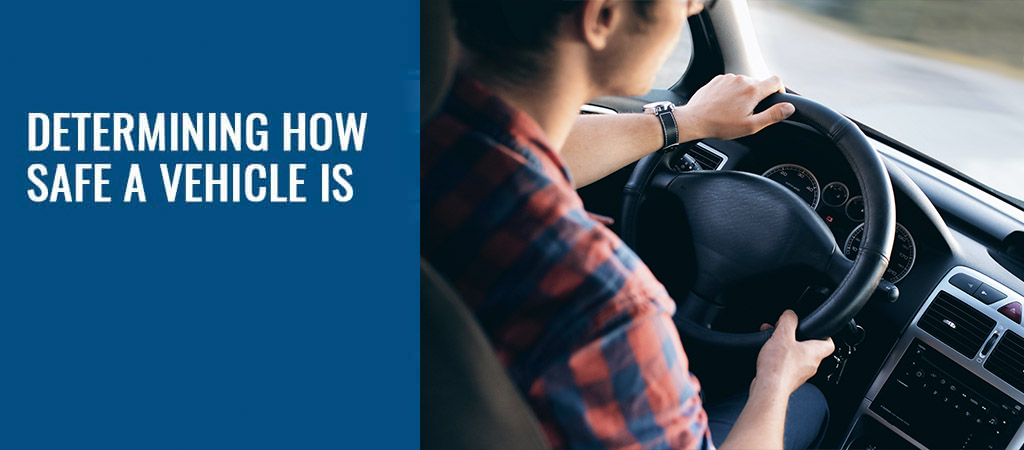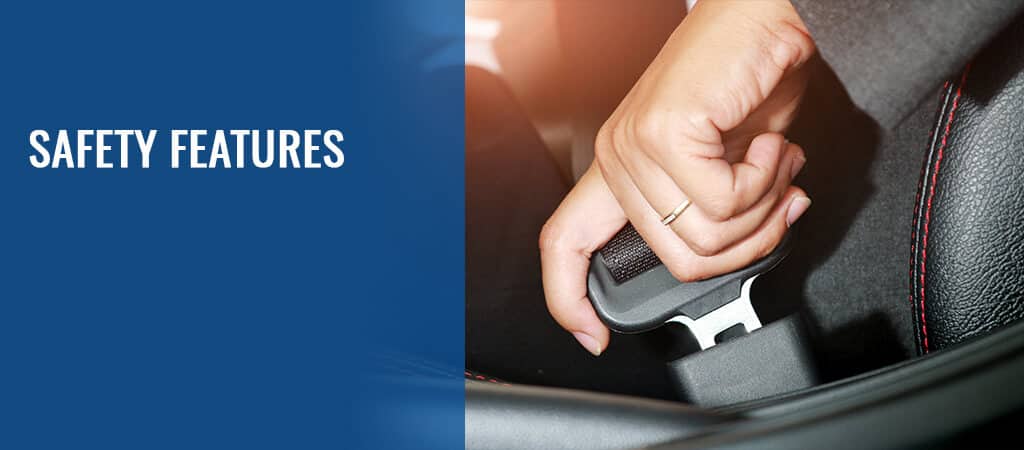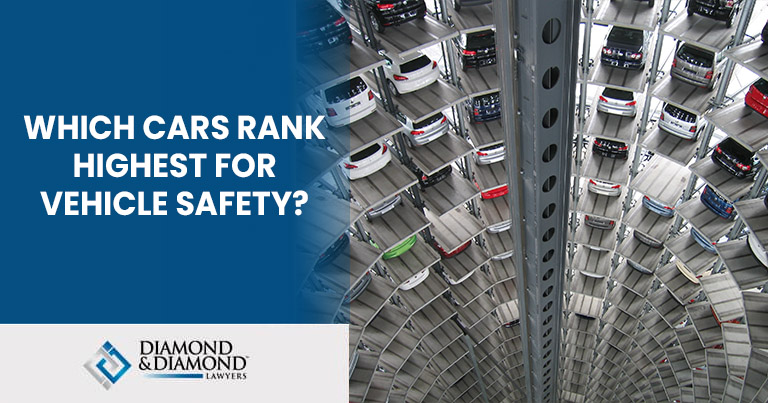Which Cars Rank Highest For Vehicle Safety?
Even though it is something most of us do everyday without too much thought, driving can be a dangerous business.
In 2018 alone, roadway accidents resulted in over 150,000 injuries and over 1,700 deaths across Canada.
Proper driver safety is essential for protecting everyone on the roadways. But sometimes, no matter how careful you are, the dangers of the road can catch up to you.
Fortunately, modern automobiles are designed with the safety of the driver and passenger in mind. They are equipped with numerous safety features and countless clever feats of engineering which can protect people from injuries or even death.
Let’s take a look at what makes a car safe — and which manufacturers produce the safest vehicles.
Determining How Safe A Vehicle Is
 Crashworthiness
Crashworthiness
When it comes to determining how well a vehicle can protect its occupants, one of the primary factors is something known as crashworthiness.
Crashworthiness is a measure of how well the vehicle can handle a crash and how well it can manage to protect its occupants.
Unlike special safety features like airbags, crashworthiness is a measurement of the vehicle’s structural stability and overall engineering. It’s how engineers measure and assess the car’s fundamental structural elements for safety, not a metric of how many safety features are built into the vehicle.
Crashworthiness assessments look at elements including:
- The vehicle’s frame, body, and overall structural support and stability
- The sturdiness of the vehicle’s roof
- The strength of the windshields and windows
- The quality and strength of the tires
To determine how crashworthy a vehicle is, automobile manufacturers are required to do extensive crash testing where test vehicles are subject to crashes in simulated real world scenarios.
In addition to their experimental crash tests, automobile manufacturers also collect data from real world crash incidents using on-scene evidence, crash reports, and post-accident inspections to continually profile the safety of their vehicles.
Safety Features
 In an effort to provide a higher level of safety for drivers and passengers, automobile manufacturers have included numerous safety features built into their vehicles which can help to both prevent accidents and protect passengers in the event of a crash.
In an effort to provide a higher level of safety for drivers and passengers, automobile manufacturers have included numerous safety features built into their vehicles which can help to both prevent accidents and protect passengers in the event of a crash.
Some accident prevention features include:
- Anti-Lock Braking System (ABS)
- Automatic Emergency Braking
- Stability Control
- Collision Alerts
- Reversing Camera
- Lane Departure Warning
- Blind Spot Warning
- Rear Cross-Traffic Alert
Features like these — and many others — are designed to provide more control over the vehicle, provide warnings to other motorists, ameliorate inclement conditions, and otherwise help to avoid an accident entirely.
In the event of an accident, some additional features help to mitigate damage to anyone in the vehicle. These include:
Vehicle Size And Weight
Although automobile engineers have managed to do amazing things for vehicle safety, there are a few basic laws of physics which aren’t going to be overcome.
When a larger, heavier object impacts an object which is smaller and lighter than itself, the smaller object typically sustains more damage than the larger object.
This means that, as a general rule, large heavy vehicles will typically be safer than small lightweight vehicles.
Vehicle’s Center Of Gravity
Center of gravity is an important factor in automobile safety.
Vehicles which possess a high center of gravity are more likely to roll-over than a vehicle with a low center of gravity.
While a roll-over is not something that should occur during normal driving, a roll-over can occur in response to erratic driving, an accident, unsafe road conditions, or inclement weather.
Large, heavy vehicles such as trucks and SUVs have a higher center of gravity compared to smaller vehicles such as cars.
Date Of Manufacture
Automobile manufacturers never stop striving to improve the safety of their designs and the capabilities of their vehicles.
As a rule, newer automobiles tend to be safer than older models. New models benefit from years of additional experience, engineering, and testing, as well as new safety features and improved materials.
Small Cars That Rank Highest in Vehicle Safety
- Honda Insight
- Kia Forte
- Subaru Crosstrek
Midsize Cars That Rank Highest in Vehicle Safety
- Hyundai Sonata
- Kia Optima
- Toyota Camry
Big Cars/SUVs That Rank Highest in Vehicle Safety
- Acura RDX (midsize SUV)
- Audi A6 (large sedan)
- BMW X3 (midsize SUV)
- BMW X5 (midsize SUV)
- Hyundai Santa Fe (midsize SUV)
- Kia Sorento (midsize SUV)
- Lincoln Continental (large sedan)
- Mercedes-Benz GLC (midsize SUV)
- Mercedes-Benz GLE-Class (midsize SUV)
- Ram 1500 Crew Cab (pickup)
- Subaru Ascent (midsize SUV)
- Toyota Avalon (large sedan)
Your vehicle of choice is important for road safety, but there is much more to learn. To ensure you’re following the rules of the road, contact Diamond & Diamond Law for a free consultation.
Talk To A Car Accident Lawyer From Diamond & Diamond Today
No matter how careful you are, sometimes a simple drive can leave you needing legal aid.
If you suffer a personal injury as the result of an automobile accident, it’s vital to get the legal representation you deserve to ensure a full recovery from the accident. Don’t hesitate to contact Diamond & Diamonds Personal Injury specialist for a free consultation regarding your case.
No matter if you have something relating to your car, truck, or even motorcycle related personal injury, we have the legal expertise needed to solve your case.
Diamond & Diamond is ready to provide guidance and legal representation for all of your Alberta motor vehicle claims.
Ready to get the representation you deserve? Call our number anytime to schedule a free consultation.
Car Safety FAQ
Is it okay to eat while driving in Alberta?
No. Eating while operating a motor vehicle qualifies as distracted driving and could result in fines of up to $300.
Is it okay to drive with headphones on in Alberta?
Drivers in Alberta may wear earphones or headphones on one ear only. A driver must have one ear available to hear road noises, environmental sounds, warning sirens, and other important noises.
Is brake checking legal in Alberta?
Brake checking is a dangerous and illegal action in Alberta and should never be performed under any circumstances.

 Crashworthiness
Crashworthiness In an effort to provide a higher level of safety for drivers and passengers, automobile manufacturers have included numerous safety features built into their
In an effort to provide a higher level of safety for drivers and passengers, automobile manufacturers have included numerous safety features built into their